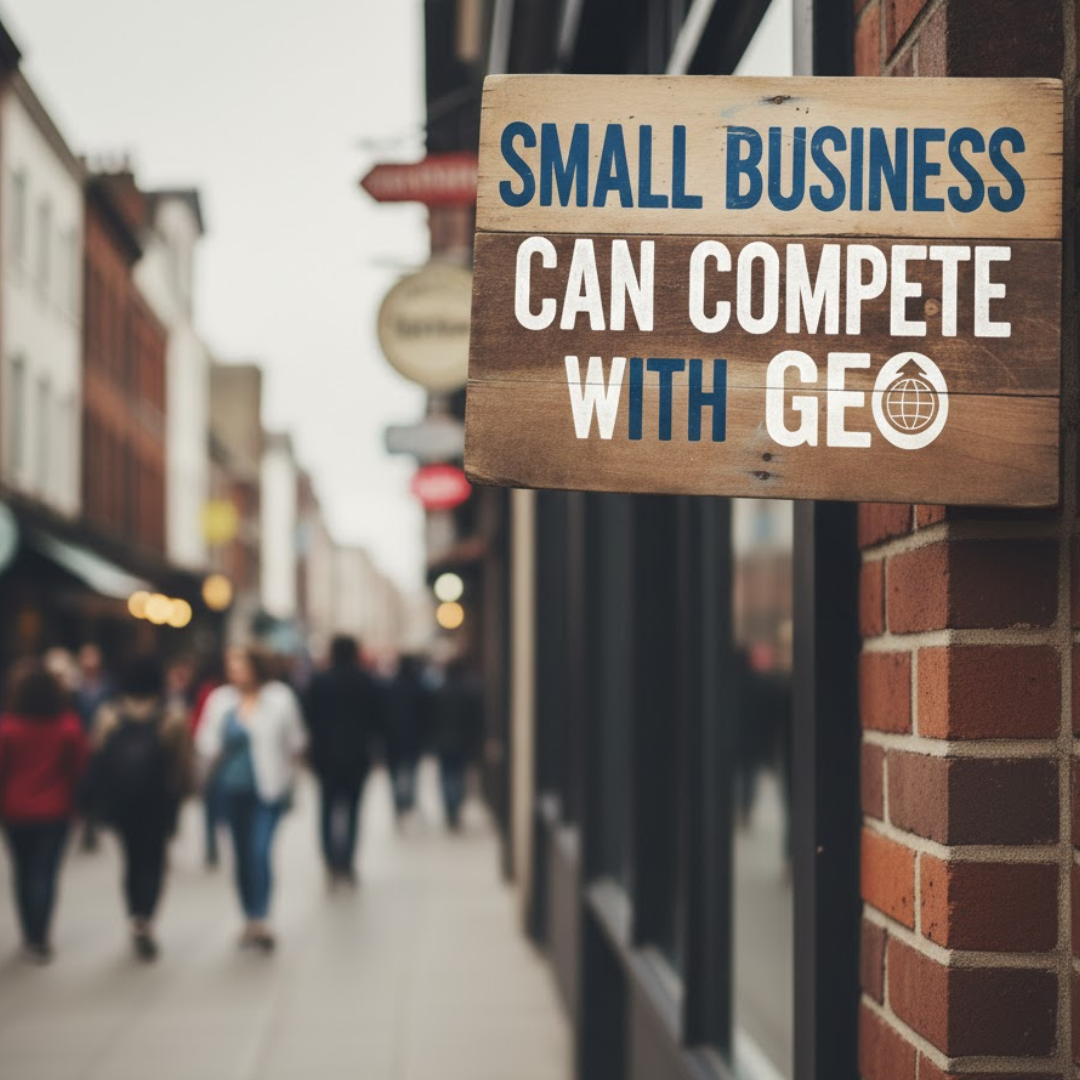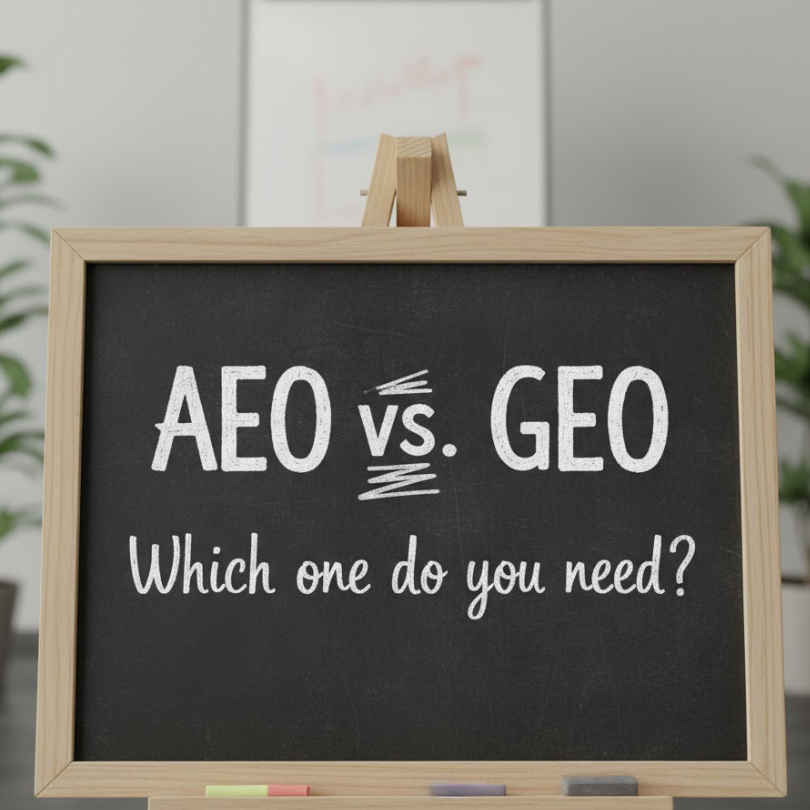
Can Small Businesses Compete with Big Brands Using GEO?
For decades, traditional SEO has favored big players — the companies with massive backlink profiles, bigger budgets, and full-time marketing teams.
But 2025 has changed everything.
With Generative Engine Optimization (GEO), smaller businesses can finally compete on clarity, not capital.
AI doesn’t just rank pages; it interprets data. And when your data is well-structured, even a local company can outrank global brands inside Google SGE, Bing Copilot, and ChatGPT results.
Here’s how GEO levels the playing field for small businesses — and how you can use it to earn trust, visibility, and authority in the AI era.
Why GEO Favors Precision Over Size
Traditional SEO rewarded scale — the more content, backlinks, and domain history you had, the better.
GEO, however, rewards data quality and contextual clarity.
AI systems don’t care about how large your brand is — they care how well they can understand your business.
In other words:
Big brands rely on recognition.
Small brands win through relevance and structure.
When your website’s information is properly organized and semantically rich, AI can read, interpret, and cite your content just as easily as it can from Fortune 500 companies.
💡 In GEO, accuracy beats authority — if you’re easier for AI to understand, you get chosen.
1. Structured Data Gives You a Competitive Edge
AI models rely on structured markup (like schema.org) to identify entities, services, and local details.
By tagging your business with the right schema types — such as LocalBusiness, Service, or Product — you give AI systems context that many large companies still neglect.
Examples of Local Schema That Help:
Business type (e.g., “Bakery,” “Auto Repair Shop”)
Service area (e.g., “serves Chicago, Milwaukee, and Madison”)
Operating hours and reviews
Geo-coordinates and contact details
📍 Structured data makes your business “AI-discoverable” — turning your website into an information source for generative engines.
2. Niche Expertise Beats Generic Content
Large corporations tend to publish broad, brand-safe content. Small businesses can focus on specific, high-intent queries — the questions real customers ask every day.
For instance:
“Best eco-friendly lawn care in Naperville”
“Affordable wedding photography near Lake Geneva”
When you optimize for niche conversational intent, AEO and GEO systems pick up your content for direct inclusion in local AI answers and summaries.
🔍 Specificity signals expertise — and AI engines reward expertise with visibility.
3. Local Authority Matters More Than Global Reach
Generative systems like Google SGE often blend data from local business listings, structured reviews, and web content.
That means a well-optimized small business can dominate hyper-local AI results even against national competitors.
How to Strengthen Local GEO Visibility:
Keep your Google Business Profile accurate and AI-friendly
Build structured review markup and reputation schema
Include service-area schema with clear geographic metadata
Create AEO-style content answering city-specific or neighborhood-level questions
🗺️ AI engines don’t just look for big brands — they look for proximity and precision.
4. Faster Adaptation = Faster Results
Smaller teams can move faster.
Unlike corporations bogged down by bureaucracy, local businesses can adopt AEO and GEO frameworks quickly — integrating structured data, Q&A content, and AI visibility tracking in weeks, not months.
That agility translates to early advantage: while big brands debate strategy, you’re already training AI to recognize your data.
⚙️ Speed is your secret weapon — every month of optimization compounds your AI visibility.
5. GEO Amplifies Your Existing SEO Wins
Already ranking on Google? GEO multiplies that visibility by helping AI systems cite your business in answers even when users never click through.
This means your SEO investments continue to work — but across more platforms and new formats.
GEO expands your reach from:
Search → Summaries
Queries → Conversations
Traffic → Trust
🚀 You don’t need to rebuild your strategy — you need to reformat it for AI.
Real-World Example — Local Visibility in Action
A small HVAC company in Milwaukee optimized just 10 service pages with schema markup, FAQ content, and geo-entity linking.
Within 90 days, their name appeared inside Google SGE summaries and Bing Copilot answers for “Milwaukee air conditioning installation.”
They didn’t outrank a national brand — they outstructured it.
How Eagles Media Helps Small Businesses Win with GEO
Eagles Media Enterprises specializes in helping local and growing businesses compete in the generative space through:
Structured data implementation and validation
Local GEO content strategy (city-based and service-based optimization)
AI visibility dashboards tracking SGE, Bing, and ChatGPT mentions
Entity recognition and schema expansion
Our framework gives small businesses the same AI visibility tools that large enterprises use — but customized for local intent and faster ROI.
💼 With GEO, it’s not about being the biggest brand — it’s about being the best understood.
Key Takeaway
GEO has leveled the playing field.
For small and mid-sized businesses, the key to winning isn’t more budget — it’s better structure, faster adaptation, and clearer data.
If your business answers customer questions better, defines itself more clearly, and builds trust through structured optimization — AI will find you, feature you, and favor you.
Generative visibility rewards precision, not size.
And that’s where small businesses finally have the advantage.





